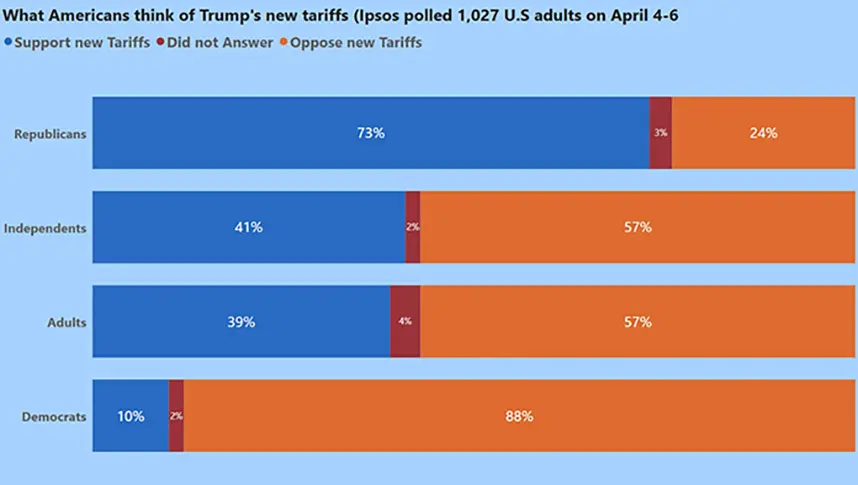According to a recent NerdWallet survey of over 2,000 people this month, 85% of Americans are worried about the tariffs.
Consumers’ main worries are that the new regulations will affect their capacity to pay for necessities and that a recession will hit the U.S. economy.
Experts think the concerns are not without merit. According to the Yale University Budget Lab, tariffs might amount to $3,800 annually for the typical household.
“Most Americans are worried about tariffs, and it’s actually impacting their spending plans,” said Kimberly Palmer, personal finance expert at NerdWallet.
A sizable percentage of respondents to NerdWallet us study said they intend to alter their spending patterns over the course of the next 12 months, with a noteworthy shift toward greater saving.
In particular, 33% want to spend less on needs, 30% want to increase their emergency fund savings, and 45% want to spend less on non-necessities. Only 14% of respondents, however, expect to make fewer loan payments.
“These tariffs are adding to that financial stress and basically forcing people to make some difficult decisions,” Palmer said. Reducing travel and anticipated expensive expenditures, such as a car, are part of that.
Building an “Emergency Savings Fund” is the top priority: Most Expert says
In these times most consumers may have to consider where to put their funds first when it comes to saving, investing and paying down their debts.
“If you have nothing [saved], start with the emergency fund,” Kates said. Stephen Kates is a certified financial planner and financial analyst at Bankrate.
This story was first published at cnbc.com, here is more from that story: Consumers are already making financial changes in response to tariffs. Here’s what experts say to prioritize
What Americans think of Trump’s new tariffs?
Ipsos polled 1,027 U.S. adults on April4-6 this is what they have to say:

Source: Reuters/Ipsos poll
73% of Americans expect price surge under Trump tariffs, Reuters/Ipsos poll finds
- 57% oppose the new tariffs, including a one quarter of respondents from Trump’s Republican Party
- Some 39% of adult respondents supported the new tariffs, and 52% said they agreed with the Trump administration’s argument that other countries have been taking advantage of the U.S. when it comes to international trade.
- Just 4% of respondents thought prices would fall and the rest expected no change or did not answer the question.
Conflicting US-China talks statements add to global trade confusion, Full Story by Reuters April 25
- Trump says talks underway, China says not true
- Trump says he has made ‘200 deals’ that would be completed within three to four weeks
- Business groups say China waives tariffs on pharmaceuticals, mulls other exemptions
“China and the U.S. are NOT having any consultation or negotiation on #tariffs,” China shot back in a foreign ministry statement posted by the Chinese Embassy in the U.S. “The U.S. should stop creating confusion.”
Trump, speaking to reporters aboard Air Force One later on Friday, said it would be a win if China would open up its markets for U.S. products and that tariffs could make that happen.
“Free up China. You know, let us go in and work China,” he said. “That would be great. That would be a big win, but I’m not even sure I’m going to ask for it because they don’t want it open.”
On Saturday, Chinese Foreign Minister Wang Yi said Beijing abides by international rules on U.S.-imposed tariffs and would seek solidarity with other countries.
“Certain countries adhere to their own priorities, engage in bullying pressure and coercive transactions, and provoke trade wars for no reason, exposing their extreme egoism,” Wang said on the sidelines of a regional meeting in Kazakhstan, according to a statement from China’s foreign ministry.
